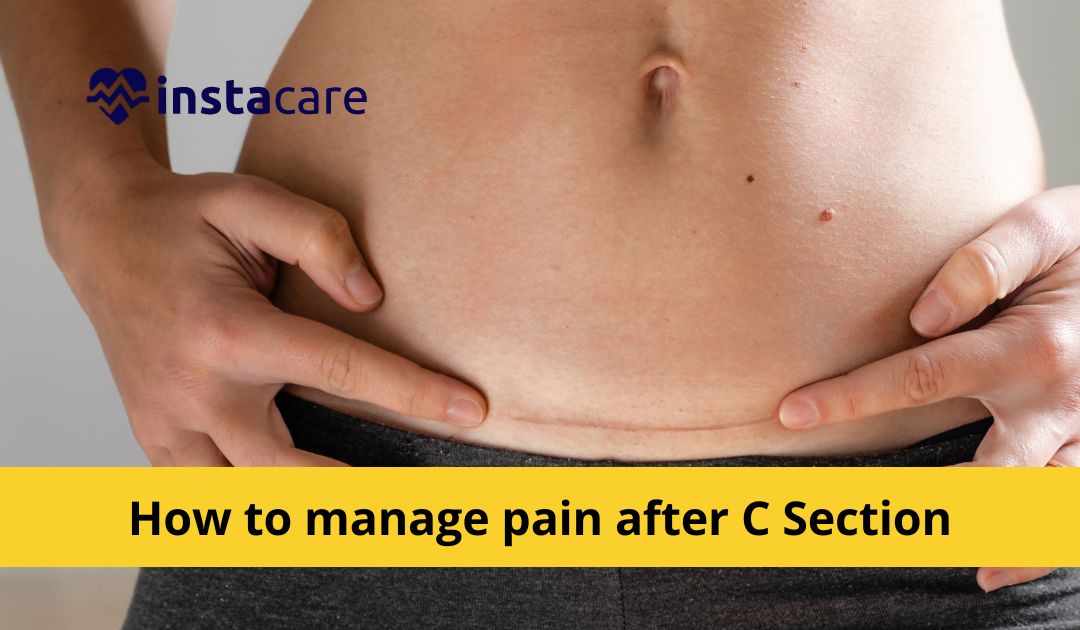The experience of giving birth can be both physically and emotionally exhausting. It involves a range of emotions, physical changes, and challenges, especially when it results in the delivery of a cesarean section (c-section). This major operation is an increasingly common event that affects many women across the world - according to the world health organization (who), more than 20 million babies are born through c-sections annually.
For those who have undergone this procedure, recovery may involve experiencing pain; while medication may help minimize discomfort during postoperative care, there are di?erent ways to manage this issue over time. In this comprehensive guide we will provide practical tips on how you can cope with pain after a c-section so you can reclaim your quality of life.
Different types of pain associated with c-section recovery
The recovery process following a cesarean section can be challenging and comes with its own unique types of pain. One of the most common discomforts women experience during c-section recovery is incisional pain. This is often felt in the area where the surgical cut was made and is typically associated with soreness, swelling, and sensitivity to touch. Another type of pain often encountered is referred pain, which manifests in seemingly unrelated parts of the body like the shoulders or the upper back, due to the nerves being affected during the surgery.
A third type of pain is gas pain, which can be particularly troublesome as it builds up in the abdomen and creates a sense of bloating and cramping. Lastly, some women may suffer from uterine pain as the uterus contracts back to its pre-pregnancy size, causing cramp-like sensations which can be quite intense. Understanding these different types of pain and addressing them appropriately can go a long way in easing the recovery process and ensuring a smoother transition to postpartum life.
Get plenty of rest
When it comes to maintaining good health and overall well-being, one often overlooked aspect is the importance of getting plenty of rest. Our bodies and minds require ample time to recharge and rejuvenate, as it plays a vital role in both our physical and emotional health. In today's fast-paced world, we find ourselves constantly pushing our limits, frequently sacrificing our sleep and relaxation time for the sake of productivity.
Research has shown that inadequate sleep can lead to a weakened immune system, increased stress levels, and reduced cognitive abilities. Furthermore, it can negatively impact our mood and mental health, leading to irritability and even depression. Therefore, it is essential to prioritize rest and find balance in our daily lives, allowing ourselves the necessary time to unwind and recover for optimal health and vitality.
Focus on good nutrition
As we navigate through our busy lives, it's essential to remember the significance of good nutrition and its impact on our overall well-being. Balancing the right combination of vitamins, minerals, proteins, and other essential nutrients is more than just a measure to prevent diseases, but it also fuels our body, mind, and productivity. A nutrient-dense diet can improve our cognitive functions, physical performance, and emotional health, allowing our bodies to perform at their peak.
It is vital to invest time in understanding which foods contribute to our well-being and make mindful choices when grocery shopping or dining out. Establishing habits such as meal planning, prepping, and seeking guidance from health professionals or utilizing reliable online resources can enhance our relationship with nutrition. By focusing on good nutrition, we can create a foundation of health that empowers us to lead lives that are fulfilling, energized, and enriching.
Manage postpartum changes
Navigating the myriad of postpartum changes can be an overwhelming experience for new mothers, but with the right guidance and support, it can also become a rewarding journey to motherhood. The physical, emotional, and mental transformations that occur during this period can be challenging and surprising, but understanding the underlying reasons behind these changes can help to alleviate any potential anxieties. As your body gradually recovers from childbirth, it is important to practice self-care and patience, maintaining realistic expectations about the return to your pre-pregnancy state.
Connecting with a network of supportive family, friends, and healthcare professionals can ease the emotional ups and downs that accompany postpartum adjustments. Whether you're coping with hormonal fluctuations, breastfeeding challenges, or navigating the various emotional stages of postpartum, being informed and prepared can make for a smoother and more positive transition into motherhood.
Take advantage of pain medications and their benefits
Living with pain can be an incredibly debilitating experience, but fortunately, there is a wide range of pain medications available to help manage and alleviate it. Embracing the benefits of these medications can truly transform your quality of life, enabling you to engage in daily activities without the constant burden of pain. Pain medications work by altering your body's perception of pain, either by interacting with pain receptors, reducing inflammation, or changing the way your brain processes pain signals.
With options such as over-the-counter analgesics and prescription opioids, there are various alternatives to choose from based on the intensity and nature of your pain. Consultation with a healthcare professional can help determine which pain medication is the most suitable for your individual needs. By harnessing the power of pain medications, you can regain control of your life and focus on what matters most to you.
Implement lifestyle changes to reduce pain intensity and duration
Embarking on a journey of lifestyle changes can significantly impact the intensity and duration of pain experienced in our daily lives. By taking conscious steps towards improving overall well-being, individuals can enjoy lasting benefits on both physical and emotional levels. Seeking a balanced approach by incorporating healthy diet choices, engaging in regular exercise, and practicing stress reduction techniques can be incredibly effective in managing pain. These changes not only strengthen our resilience against discomfort but also promote vitality and improved quality of life.
Furthermore, adopting preventative measures such as maintaining proper posture and employing ergonomic strategies can safeguard against the development of detrimental habits, ultimately resulting in a substantial reduction in pain intensity and duration. Take charge of your wellbeing by implementing these lifestyle transformations, and embrace the potential for a life with reduced pain and increased happiness.
Get moving as soon as you can walk
From the moment we take our first steps, engaging in physical activities has the power to positively impact our lives in a multitude of ways. Not only does getting involved in active pursuits encourage healthy growth and development, but it also fosters social connections, offers opportunities for skill-building and instills a sense of self-confidence. As children emerge into their journey of exploration and discovery, they benefit immensely from early experiences that incorporate motion and play.
Through sports, dancing, and interactive games, individuals of all ages can unlock the doors to a healthier and more fulfilling lifestyle, reaping the invaluable rewards that come from getting moving as soon as they can walk. Embracing a physically active lifestyle from an early age can help lay the foundation for lifelong habits and lead to greater happiness, making it essential to prioritize movement in our lives.
View More: How To Get Rid Of Hanging Belly After C-Section - Top Tips
Don’t avoid or delay your pain medications
It is exceedingly important for individuals experiencing pain to understand the necessity of not avoiding or delaying their pain medications. Pain management plays an instrumental role in the overall well-being of a person, contributing to their comfort, healing process, and quality of life. By addressing pain promptly and consistently, you can prevent the escalation of pain levels, thereby allowing your body to focus on rehabilitation and restoring optimal health.
Furthermore, circumventing needless suffering has psychological benefits, reducing stress and fostering a more positive mindset during recovery. It may seem tempting to exhibit stoicism by trying to power through the pain, but doing so can have detrimental effects on your recovery journey. In conclusion, you should adhere to prescribed pain medications without delay, collaborating closely with healthcare professionals, and prioritizing self-care during difficult times.
Wear loose-fitted clothing
When it comes to comfort and health, wearing loose-fitted clothing is a smart choice that everyone should consider. Not only does it provide necessary freedom of movement, but such attire also allows your skin to breathe, promoting proper ventilation and reducing the chances of overheating. By choosing garments that don't constrict, you can minimize the risk of circulation problems and avoid issues like skin irritation and chafing.
Additionally, sporting loose-fitted clothing aids in eliminating the unwanted consequences of tight garments on your body's natural contours, maintaining an overall smart appearance. So, make it a point to incorporate a variety of loose-fitted clothing options into your wardrobe to reap the multitude of benefits they offer.
Hold your incision
Hold your incision is an essential technique in the medical world that focuses on effectively managing post-surgical wounds. As a patient who has undergone surgery, understanding the importance and proper care of your incision is crucial. Hold your incision involves applying gentle pressure on the surgical site to protect it from any strain caused by sudden movements, coughing, or even sneezing.
By implementing this technique, patients can significantly reduce the risk of complications such as infection, wound dehiscence, and prolonged recovery periods. Furthermore, the healing process may be accelerated, leading to a smoother overall post-operative experience. It's vital for patients to pay close attention to their surgeon's advice and diligently follow all aftercare instructions to ensure the best possible outcome from their surgery.
Follow instructions about lifting
Lifting objects, whether it's a box of office supplies or a barbell at the gym, may seem like a mundane task, but doing it improperly can have serious consequences. Adhering to proper lifting techniques not only helps maintain good posture but also protects our joints and muscles from strain and injury. Firstly, make sure to evaluate the load you're about to lift – determining if it's too heavy or if you need assistance can save you from potential discomfort. Then, position your feet shoulder-width apart, ensuring stability and balance.
Gently bend your knees and keep your back straight while maintaining a tight grip on the object. Remember to engage your core as you lift, using your leg muscles and avoiding twisting or jerking motions. Furthermore, don't forget to take breaks and give your body the rest it needs. Additionally, utilizing equipment like gloves or lifting straps can provide extra support and reduce the risk of injury. By diligently following these lifting instructions, you'll promote safety and efficiency throughout your daily life and avoid potential harm to your well-being.
Learn how to use hot/cold therapy
Experiencing postoperative discomfort is a common concern for many individuals after undergoing surgery. However, you can effectively alleviate this distress by learning how to properly use hot and cold therapy techniques. Hot therapy, also known as thermotherapy, can be especially beneficial for relaxing muscles, soothing stiffness, and increasing circulation to promote the healing process of the affected area. Cold therapy, or cryotherapy, is an excellent method for reducing inflammation, numbing pain, and limiting additional tissue damage.
In order to obtain the maximum advantage from these therapeutic strategies, it's essential to diligently follow the guidelines provided by your healthcare professional, apply heat or cold to the appropriate locations, and practice patience as your body recovers from surgery. By incorporating hot and cold therapy into your postoperative care routine, you'll be well on your way to effectively managing discomfort and fostering a smooth recovery journey.
View More: 10 Tips To Help Speed Up Your Menstrual Cycle And Get Your Period Immediately
Seek professional help
Persistent or worsening pain should never be ignored, as it might be an indication of an underlying condition that requires medical attention. Seeking professional help is crucial to ensure appropriate diagnosis and treatment, which can dramatically improve your quality of life. Medical professionals possess the necessary expertise and resources to thoroughly assess your pain, identify its root cause, and recommend suitable management plans.
Their guidance and support can relieve the pain effectively and prevent it from causing further complications. Remember, taking charge of your health is of utmost importance, and timely intervention with persistent or worsening pain may immensely contribute to achieving a pain-free life.
Conclusion
In conclusion, it is clear that one must stay conscious to better manage pain after a c-section. Not only must you assess the pain daily, but also understand how different approaches can be beneficial and seek help from friends and family. Furthermore, there are several practical steps you can take. It’s important to create a safe space at home where you feel comfortable by setting up a cozy pillowing area with maximal support. Don’t be afraid to use hot or cold therapy on problem areas, avoid slouching in poor posture and ensure proper rest as this proves especially beneficial for discomfort management.
Lastly, don’t forget to move around and make sure to engage in light exercise as focusing too much on recovery may cause more harm than good; take small steps at first and make sure that everything feels manageable! Ultimately, if the c-section pain persists longer then expected or presents itself in severe intensity, don't hesitate to ask your doctor for relief aid or contact a physical therapist. Good luck!
Please book an appointment with the best Gynecologist in Lahore, Karachi, Islamabad, and all major cities of Pakistan through InstaCare, or call our helpline at 02137136090 to find the verified doctor for your disease.
Source: https://instacare.pk/blog/how-to-manage-pain-after-c-section












